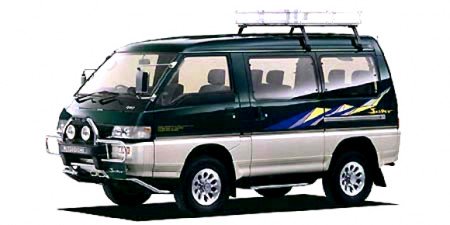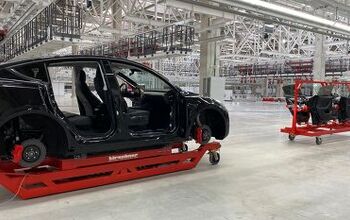Mitsubishi Vans Are A Delica-te Matter In Canada
For the first and possibly last time ever, the Mitsubishi Delica was a front page story in a national newspaper, with The Globe and Mail reporting on the “backlash” resulting from these “quirky” cars.
The Globe, which is widely regarded as Canada’s paper of record, chose to put the venerable van on page A1, ahead of stories about Syria, ISIS, Boko Haram, Libya and the lack of new manual station wagons.
According to the paper, the Mitsubishi Delica is raising ire, to the point where
“…various provinces and organizations across the country mobilizing to prevent even more of the vehicles from washing up on Canada’s shores…Concerned by the rising number of right-wheel-drive imports, ICBC analyzed crashes involving vehicles like the Delica. In 2009, the agency published its alarming findings: Right-wheel drive vehicles were 40 per cent more likely to be in a crash, and 56 per cent more likely to cause one, than left-wheel-drive vehicles. The driver’s position is believed to make everyday manoeuvres – such as pulling away from a curb or making a left-hand turn – much more dangerous.”
Granted, there are legitimate safety concerns regarding right-hand drive vehicles. For one, the positioning of the headlights must be modified. If they aren’t, then they tend to be angled right into oncoming traffic, which presents an obvious safety hazard.
But there’s also the unspoken fact that many right-hand drive vehicles are performance models like the Nissan Skyline GT-R and Toyota Celica GT-Four. They tend to be purchased by young, testosterone-addled males who are likely to drive them at dangerous speeds on public roads. This is likely to contribute to the alarming crash rates, and a reason why Quebec and Prince Edward Island moved to ban right-hand drive cars earlier in the decade.
There is also pressure from dealer groups and other parties who stand to lose out economically. Although BC’s government-regulated insurer has asked for changes in the rules, they don’t appear to be coming any time soon
Mark Francis, an ICBC manager of provincial vehicle registration who is on a national working group on the issue, says they asked Transport Canada to increase the number of years before a vehicle can be imported from 15 to 25. That number – which would be in line with the United States – would effectively kill the importation of modern Delicas by making it no longer economic for Japanese exporters to warehouse them.
“We’re taking their junk, as we view it,” Mr. Francis says. He adds, however, that the lack of any high-profile crashes involving these vehicles means there’s little incentive to act. “We’re not expecting them to do anything in the near future.”
Surely, the government has a whole host of priorities that are far higher than restricting what a niche group of enthusiasts can import into the country, right?
More by Derek Kreindler
Latest Car Reviews
Read moreLatest Product Reviews
Read moreRecent Comments
- Jeffrey Elon Musk is a questionable leader. His leadership style doesn't build trust with his employees and it slows innovation and development. His focus should be on people, product, and customers not himself. The competition in this area is fierce and Tesla's products look tired and repetitive their sytle language is no longer innovative or industry first.
- Joe65688619 Looks like they at least have the same button controls for HVAC and radio as my RDX. Glad to see the've done away with the touchpad. But it's hard to see how the MDX will successfully compete with the Grand Highlander (or the ZDX vs. the Lyric, for that matter, even though they share the drivetrain.) The RDX/ZDX/MDX look too much alike - maybe Mazda can get away with the 50/70/90, but when I drive by an Acura dealership I see too many vehicles that look pretty much the same (and pretty much the same as they have for close to a decade now).
- Redapple2 F1- crash at tunnel entrance when douche wipes out team mate ? GOLD!
- Redapple2 I turned off indy after the 7 th yellow (and 2nd or was it the 3rd time they couldnt make it 2 laps laps more before another crash (it was like a demolition derby)). I wanted to tune in the last 20 laps my remote got confiscated. Monaco> why does that Princess look so spaced out all the time?
- Redapple2 Modern faux retro styling? I m beginning to HATE it. Was the PT Cruiser the first - 20 some years ago. Next, my new Land Rover in 2006 was in the shop 3x in the first year. Almost came to blows with the service manager when they wouldnt admit to a defect and wanted me to pay $1200 on something. (an 8 month old car mind you). 3- what s with the smaller square tail lights next to the bigger square tail lights? Cheap gimmicky styling flair? I truly cant stand Land Rovers any more. I ll buy a Yukon Denali from evil gm Vampire before I buy one of these.


































Comments
Join the conversation
I would think someone is missing out on a profit. Should be easy to make conversions to LHD. Don't know that the bargain seekers would be willing to spend what it took. IIRC these and a similar Toyota were valued in both Mongolia and Siberia. If it's tough enough for that I'm sure it would do fine on my little farm. The people I know who drove Mitsubishi trucks or SUVs got a lot of miles out of them. This van appeals to me.
I'm sure the car dealers association of British Columbia is behind this, fronted by their friends in the current provincial government. Say about 10 years ago, you had to pay full provincial taxes when you bought a used vehicle from a dealer, but only partial taxes on a private sale. Then the provincial government replaced the provincial taxation with the HST, which was a federal-government backed tax setup, and which applied to just about everything including private vehicle purchases. The public revolted and got the HST removed and the old taxing reinstated. Except that thanks to the efforts of the car dealers, the one item that retained full taxation was private car sales. It did not go back to the original situation of only partial taxation. This glaring inconsistency demonstrated the power of the car dealers. People have commented on the 15-year age level for JDM's. I believe this has less to do with local regulations and more to do with cars in Japan being required to be less than 15 years old. This, and the Japanese tendency to look after things, means there are lots of perfectly good vehicles available for export all over the world. So many that JDM's sell for about half what an equivalent left-drive would cost, and enough that many people are willing to put up with sitting on the "wrong" side. Whether ICBC suffers losses insuring JDM's is up to ICBC. They can charge whatever it takes to insure these vehicles. Factor that into purchase prices and people are free to decide whether to buy JDM's. JDM vehicle types include vans, from simple to executive-jet appointmented versions with 4wd, low ranges and turbo diesels; Kei cars from tiny fake VW microbus' to 2-seat convertibles; cars from hot sports cars to plain sedans; minvans like the original Toyota minvan; utility trucks like flatbeds, cube vans, 4-door flatbeds and some with 4wd; and various off-road heavy duty suv's with all imaginable trimmings.